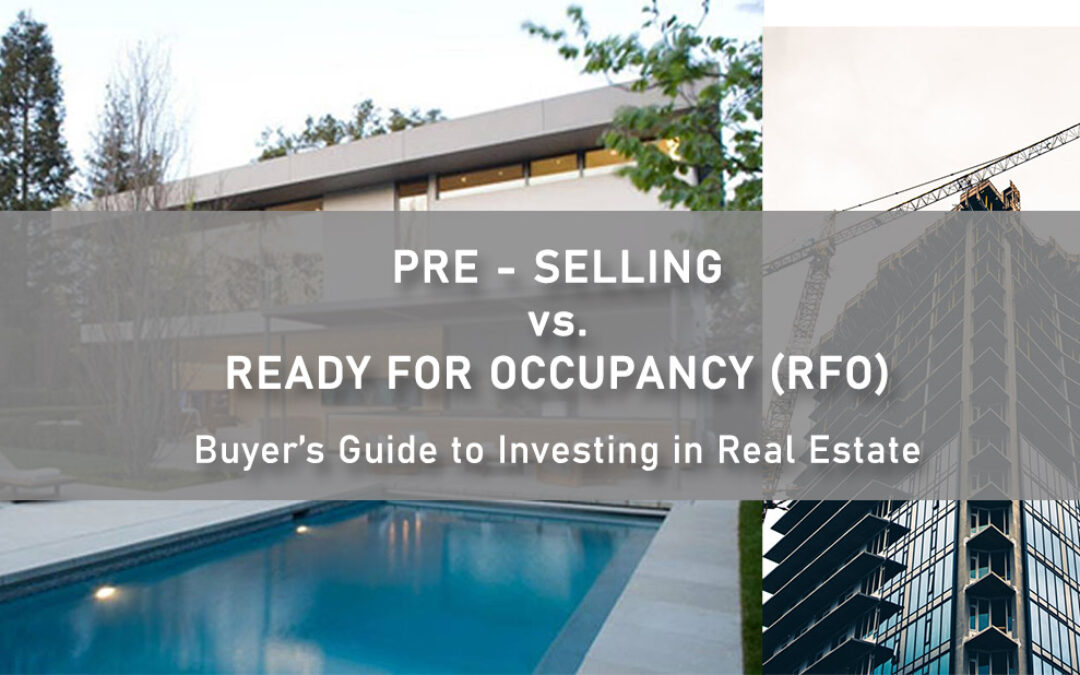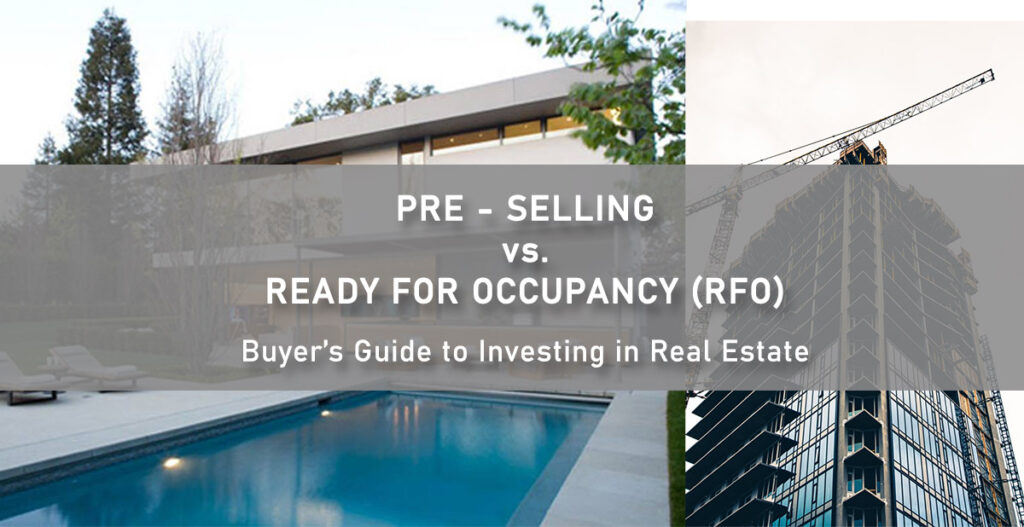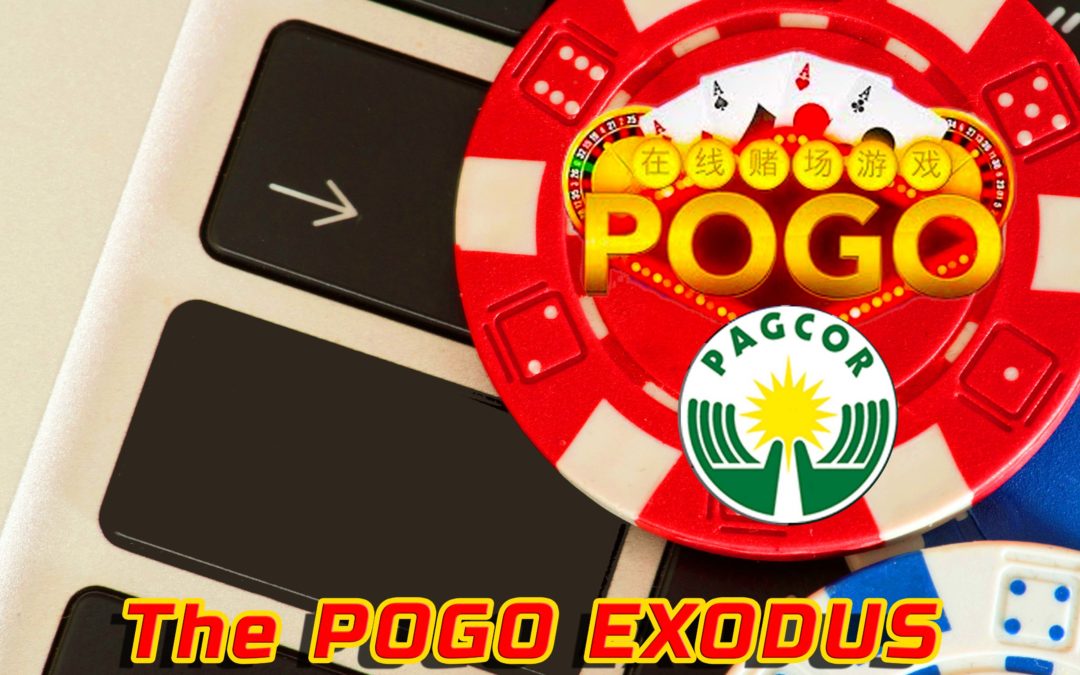
by Doah Sto. Tomas | Jul 1, 2021

How do you prefer to have your condominium or town house? Do you want to be the first occupant, or do you not mind living in a place that was previously owned by other occupants? Do you want to see the actual finished product before purchasing, or would you not mind investing in a building that’s yet to be finished?
Those are just some of the concerns often heard and talked about as clients scout for options regarding condominiums, house and lots, as well as town houses. Good for real estate developers and clients, there are two types of properties available in the market. Let us give you some useful information on what these options are.
What is Pre-Selling?
The term “pre-selling” refers to the condominium units or townhouses/house and lots that are sold prior to its completion. Real estate developers wanted to cater to clients who might not exactly have the budget to purchase the finished unit but has money in the bank enough to pay for a spot in a physical property.
One setback in pre-selling units is that you don’t get to appreciate the finished infrastructure because you don’t really get to see it until it’s really done. In fact, your expectations may be a tad different from what you will see when the final product is ready.
However, the good news is that there are dressed up and turn over condominium units, model townhouse units/ house and lots that your agent or broker can show you. It means that you don’t really need to do guesswork or blind buy into something costly.
Given these considerations, you might also want to get in touch with a developer with a good track record in terms of infrastructure and design so that you can at least enjoy the aesthetics as you envisioned it to be.
Is RFO for you?
After the building or property has been completed, it will be sold and RFO or “Ready For Occupancy.” If you need a roof on top of your head as soon as possible, then RFO is the way to go.
If you’re the type of client who wants to be guaranteed of quality in terms of construction and design before making a purchase, then RFO will allow you to examine the physical aspects – amenities and facilities — of your property. It will be easier for you to judge whether you will push through with your investment if you have seen it.
The potential issue with RFO is that most of the good units or home properties with good views and prime spots have been sold during the pre-selling stage. That would mean that the units that have been left will be your only choices.
Making your smart choice
Now that you’re well-versed in these terms, you can better weigh your options in case you’d like to invest in a real estate property. Pre-selling is financially more accessible to most potential clients, but it has its risks. RFO has lesser risks but indeed it’s heavier on the pocket.
Again, we advise you to get in touch with a real estate broker or a developer that has a good record that you can trust so that you will have more chances of making the right choice.

by Doah Sto. Tomas | Jun 24, 2021

After the harsh onslaught of the pandemic, many people thought that the real estate industry would eventually go down the drain. And why not? Real estate selling starts with handing out of glossy flyers to people in crowded places like malls and thrives on actual visits around and out of town. Unfortunately, all these were prohibited during the lockdown and caused somewhat of an economic turmoil and frustration not only in real estate, but in the realm of most businesses around the world.
A NEW MARKETPLACE
Fortunately, there was social media and digital ads. Digitalization made it possible for real estate to operate on the web. It did take some time before the industry could adjust to the new normal. The digital transition was not easy, but doable, anyway. After all, houses and living spaces are a necessity even during the time of the pandemic. A little more than a year after the pandemic began, most real estate companies shifted from the usual interpersonal communication to the digital marketplace. And what made this work was keeping the clients constantly informed and updated with what’s going on.
A ONE-STOP LOCATION
In terms of updated services, real estate developments became more comprehensive and holistic in terms of what they offer. Buildings have now combined residential, office, and commercial spaces, with the idea of safety and not just convenience. The idea is that the less people leave the vicinity of the safety zone, the less chances of transmitting the virus and putting neighbors in danger. Apparently, this idea is something that has not been thought of before the pandemic. But now, it has become a selling point for developers.
CONTACTLESS SOFTWARES
No one wants to touch anything nowadays because pathogens stay on surfaces for days and these have elicited fear among people. So as a solution, most condominium projects now have smart home features like using QR Codes which allows dwellers to move around without having to constantly touch objects and transmit the disease to others. It does not really come off as costly, considering the safety and security that it offers. We cannot stress it enough, that an ounce of prevention is always better than a pound of cure.
SOCIAL DISTANCE
The real estate industry identified a novel factor that now drives buyers to purchase properties: vast space. With the new normal health protocol, people wanted to move out of congested areas because they feared COVID-19. In effect, more and more potential buyers inquired about properties situated outside the metro. Preferences were Laguna, Cavite, and Pampanga. These are provinces not too far from the capital region. Even Iloilo and Cebu were choice areas in the South for those who wanted to relocate or simply buy. And because of the remote working conditions, most professionals were not deterred by the distance. Still, safety was the primary consideration.
THE RAY OF LIGHT
The industry recovery in the first quarter of 2021 promises a brighter future in world of real estate. For one, the demographics of buyers are now younger, coming from the 20–30-year-old brackets. The health sector’s continuous push for physical distancing has encouraged a lot of people to go solo as much as they can, if that is the best way to save themselves from the perils of the pandemic.
The vaccines are here, and hopefully, as soon as we reach the point of herd immunity, there will be another shift in the industry. The economy will adjust to a now normal and people will have access to bank loans, making it possible for them to buy properties again. Thus, the real estate industry will surely see better days ahead.

by Myk | Aug 16, 2020

A LOOMING PARADIGM SHIFT
By: CRB Norie G. Datar
The unprecedented magnitude of the tragic brought by the global outbreak of COVID-19 and as the world continues to battle the war against this virus, by force of nature slowly changed the way people live and think, driving us to adapt a new life model, attuned to the changing environment. People are learning to adapt a “flux mindset”, exuding the power of resilience, moving into a new direction, a new roadmap to bridge the situation now and then.
How do we moved-on with the changing times? As we navigate the world of real estate and recognizing the industry as one of the major economic drivers in the Philippine economy and the real estate service practitioners’ key role, it is of paramount importance to look at the aspects in the practice that have directly impacted by the pandemic that leaves us no better option but to stay relevant to the new environment.
With all rationality, I am looking at the Continuing Professional Development (CPD) program, as one aspect. It is crucial at this point in time that we maintain a strong working knowledge with reasonable proficiency. It is now time to re-evaluate the kind of knowledge and the kind of learning materials we need to possess. We need to provide fresh knowledge, most relevant at this time and shelved those recycled lecture materials. We need to re-establish an acceptable and doable standards of learning to further strengthen the future of our profession. We need to shift trajectory and infuse subjects that are apt with the changing times.
Another aspect that we should be looking at, is the proliferation of unlicensed practitioners. We have aired so much of our sentiments at the various social media platforms, now it is time to zero-in and act constructively on how we should be dealing the issue, not discounting human consideration, as we all need to survive. While waiting for the rebirth of AIPO, we can do our part to address this most defining issue of our time. Let us create a venue to collaborate and deliberate professionally, in order to come-up with an effective ways to institutionalize our practice.
As people look at the future of the industry as bleak, clouded by fear and uncertainty, it is therefore, high-time to recalculate, find new territories, and break new grounds, to see lights and brightness.
Should we be ruled by fear and uncertainty?
Just my two cents.
CRB NORIE DATAR
REBAP Global City
About the author
CRB Norie G. Datar, MPA, DTM, REA, REB, EnP., is one of the 2020 REBAP Global City Chapter Advisers. She was 2015 and 2016 REBAP Chapter President for Global City, 2018 REBAP National Board of Trustees and 2019 REBAP National Secretary General.

by Doah Sto. Tomas | Jul 3, 2020

“The ultimate measure of a man is not where he stands in moments of comfort and convenience but where he stands in times of challenge and controversy.” – Martin Luther King Jr.
The POGO Exodus
COVID-19 has been dubbed “the great equalizer”. It doesn’t distinguish between rich or poor, good or evil, young or old, the powerful and the weak, nor does it care about national borders or governments. It is simply a virulent, invisible force of nature that has spread to nearly every corner of the modern world as we know it. Unceremoniously shutting down big and small businesses and companies alike. The pandemic has impacted nearly all industries where human contact and interaction is an essential part of daily operations. And the gaming and amusement industry is no exception to this.
You may ask, what does this have to do with the real-estate industry? It has been no secret that the Philippines, through the PAGCOR (Philippine Amusement and Gaming Corporation) has welcomed POGOs (Philippine Offshore Gaming Operators) with open arms despite being a controversial or touchy subject matter for a lot of Filipinos. The government has touted the country as an ideal destination for online casinos due to. According to PAGCOR, there are 56 PAGCOR-licensed POGOs as of June 2019. And it has been estimated that at least 30 POGO firms are operating illegally in the Philippines. In fact, 265 Chinese nationals were arrested as the result of a raid of an illegal gambling operation in Las Pinas City on May 15, 2020. The illegal POGO was operating out of a rented hotel, even despite the pandemic and quarantine lock-down.
POGOs have come to the Philippines in droves bringing with them thousands of Chinese nationals that operate the lucrative offshore gambling businesses. This huge influx of Chinese nationals of course needed somewhere to stay, and the real estate industry was suddenly rife with opportunity as POGOs started snatching up properties in close proximity to their operations so they could quickly ferry their employees to work. Not only that, a study by KMC Savills Inc. has revealed that POGOs have utilized an estimated 800,000 square meters (or 8,600,000 square feet) of office space to house their operations.
This proved to be a big opportunity for those in the real estate industry. Chinese POGOs were willing to pay higher than the normal rate to lease property in locations near their operations. Property owners were now more than happy to lease out their property with preference for Chinese nationals working at POGOs. However, the downsides would soon rear its ugly head.
Those living in exclusive subdivisions now suddenly had a growing community of noisy Chinese nationals as their neighbors. Complaints and horror stories of property damage began to increase as a significant number of the Chinese nationals apparently had little respect for the property they were living in, as well as a general lack of household cleanliness and regard for property upkeep. Another sad by-product of the POGO real estate gold rush was the artificial shortage of property for Filipino families looking for fairly priced property. Rumors about local tenants being evicted or their lease not being renewed in order to give way to Chinese nationals started to spread as well.
Fast forward to March 21, 2020. In a bid to combat the Covid-19 outbreak, the PAGCOR orders all gambling operations to cease operations until further notice. Needless to say, POGO operations suddenly ground to a screeching halt. Except for those operating illegally, all legitimate POGOs found themselves in a bad financial situation. Gambling operations typically run 24×7 and thereby employs a large number of employees. Now these employees are unable to go to work due to the government-imposed quarantine measures. Surprisingly, PAGCOR even went so far to suspend work-at-home setups for those under their jurisdiction to ensure compliance. POGO licenses and services providers found to be non-compliant now faced possible cancellation of their license and accreditation, and will be reported to the authorities. On top of this, POGOs are currently under scrutiny for unpaid taxes with the BIR (Bureau of Internal Revenue), as well as controversies surrounding a growing number of “sex-dens” servicing foreign workers.
The pandemic in the Philippines still appears to be nowhere near “flattening the curve” as experts put it. To date, at least two POGOs have already left the country and more are now poised to leave the Philippines according to PAGCOR Chairperson and CEO Andrea Domingo. An unspecified number of POGOs have also filed for the cancellation of their licenses, while others have yet to file their official exit. PAGCOR claims that the primary reason for this is not just the impact of the pandemic, but due to “more appealing tax rates” and “friendlier environments” as decision-makers behind the POGOs re-evaluate their options.
With all of this in mind, the most likely scenario is that POGOs are on their way out. And with them goes the potential for cashing in on significantly higher lease rates. Just barely a year ago, POGOs overtook BPOs (Business Process Outsourcing) in real estate utilization and contributed over 6.4 Billion Pesos in taxes. Now, it is only a matter of time before the POGO real estate deep well dries out.
by SYSTEM ADMIN | Oct 5, 2019
For most entrepreneurs, starting up your own business is just like raising a child. You love and nurture it, you sacrifice your time, energy and resources for it, you keep on thinking about it even when you’re home or on vacation, you spend sleepless nights worrying about it, you make preparations for it’s future, and sometimes, you cry for it when things don’t go as planned. Worst case, everything you did for it might not bear fruit at all…
But the good thing is, you can start all over. And if you’re smart, you’ll be able to use all that you’ve learned from everything you’ve gone through. And hopefully this time, with enough planning, good decision-making and perseverance, you can eventually see your child grow up to be a parent.
No one ever said being your own boss would be easy…

The post The Parent appeared first on PHILREP Realty Corp..
by SYSTEM ADMIN | Oct 4, 2019
If you have a knack for marketing, buying-and-selling, and you have that client-comes-first, positive attitude and never-say-die personality, the real-estate industry is one of the most rewarding jobs you can venture into right now.
Most people who are really good at selling normally start out on a small scale. You’ll see a lot of enterprising individuals (a lot of them OFWs) who sell their hand-me-downs for affordable prices on FB live and make a good profit. They’re usually good at building rapport with their target audience and this is a critical skill for anyone in the buy-and-sell business.
A lot of aspiring real-estate sellers have experience and good people skills, but why are most of the folks I talk to hesitant to get into real-estate selling? One of the biggest challenges I have observed with the people I’ve interacted with boils down to the fact that they get overwhelmed by the price tag of what they’re selling. Most of them have been used to selling items that range in the hundreds to couple of thousands of pesos. But in real-estate, they suddenly have to sell properties that can be anywhere in the hundred of thousands up to several millions of pesos. And the price tag somehow intimidates most of them.
I’ve been in the same boat before, so I can understand how they feel, I used to be part of a startup IT company earlier in my career. One of my roles included coming along with the marketing team to present our proposal to clients. As a technical person, that was the time I had to quickly learn how to explain and justify to clients why the solution they were buying was so expensive. Trial by fire experiences come one after another, some worse than others, but I took it all in stride, because I learned what I did correctly, and more importantly, I learned what NOT TO DO in the future. So here’s my unsolicited advice to all you aspiring real-estate sellers…
You are selling something of great value to someone. It is not just a structure built out of concrete and steel, it is a FUTURE HOME of a family. It is where fond memories will be built upon and preserved. These intangible things are PRICELESS and cannot easily be assigned a monetary value.
If you are still not convinced, think of if this way: Do not look at the total contract price, think in terms of Monthly Downpayments and Amortizations instead. It becomes easier as you look at the bigger picture. Also, your client is making an INVESTMENT that can pay for itself in the future if they decide to rent/lease out their property. Real-estate very rarely depreciates in value after all.
And if you do your job well and show your client that you actually care about their dream of finding a HOME, then just might be pleasantly surprised at repeat business and referrals from your happy clients!
HAPPY SELLING EVERYONE!!!
About the author:
Jay Dominic Sto. Tomas is a board member of PHILREP Realty Corporation and a certified IT Architect at IBM
The post I WANT TO GET INTO REAL-ESTATE SELLING BUT… appeared first on PHILREP Realty Corp..









